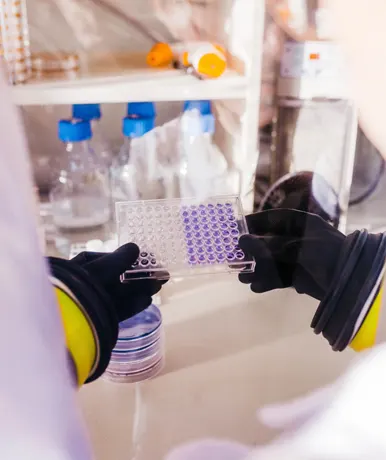BIOLOGICAL MEDICINES
BASED ON BACTERIA
Developing bacterial immunotherapies to address unmet medical
needs in oncology and infectious disease
Microviable’s pipeline encompasses two different product modalities and two medical areas with a common driver: modulating the immune response to fight life threating diseases using orally delivered capsules containing living bacteria.


MVT-201
A unique purified microbiota ecosystem product obtained through a patent-protected purification process (WO 2025/141228). Is a non-propagated, donor-derived, high-diversity and high-richness product generated with our proprietary technology obtaining human purified microbiota (HPM®) in viable conditions with full functionality.
This product contains the microbial fraction of the microbiota, discarding any other fecal components. It has a higher safety profile than any other products guaranteed by the purification process where potential human virus are discarded together with carcinogenic metabolites.
Preclinical programs:
CMC:
Indications:
INFECTIOUS DISEASES AND MDROs
Antimicrobial resistance is a global threat that generates 4.9 million annual deaths globally due to infectious disease caused by pathogens that are multi-drug resistant. Noteworthy, 39% of infections are generated by pathogenic bacteria already resistant to the last lane of antibiotics, so there is no tangible solution for these patients.
Data obtained from World Health Organization (WHO), The World Bank and research manuscripts published such as: Drug-resistant infections: A threat to our economic future, 2017, World Bank Group. Global Burden of bacterial antimicrobial resistance in 2019: a systematic analysis, The Lancet 2022, 399:10325, 629-655.
The main threats are carbapenem-resistant and extended-spectrum beta-lactamase producing Escherichia coli and Klebsiella pneumoniae, together with vancomycin resistant Enterococcus faecium, among others.
MVT-201 is intended to treat and prevent recurrent infections generated by these pathogens like recurrent urinary tract infection (rUTI), nosocomial infection (hospital-acquired infection), and infections associated with critical patients like those subjected to oncological treatments. MVT-201 has shown great preclinical efficacy reducing MDROs in infected murine models.
Mechanism of action
Colorectal Cancer
Colorectal Cancer (CRC) is the 3rd most common cancer worldwide with 1.9M new cases in 2022 and 930,000 deaths the same year. It represents 10% of all cancer cases and it is the second leading cause of cancer-related deaths worldwide. Noteworthy, the burden of CRC is expected to grow up to 3.2M new cases per year with a potential of 1.6M deaths annually by.
Data obtained from World Health Organization and research manuscripts published: https://www.who.int/news-room/fact-sheets/detail/colorectal-cance
Díaz-Gay, M.,dos Santos, W., Moody, S. et al. Nature (2025), doi:10.1038/s41586-025-09025-8
Unfortunately, it is affecting younger people, below 40 years of age, and early-onset of CRC has been correlated with colibactin-producing bacteria (E. coli pks+) present in the microbiome. Colibactin can act as a toxic agent, inducing DNA damage and affecting colorectal crypts that will ultimately lead to generate the tumor.
MVT-201 is intended to treat CRC patients, in addition to the standard of care, to ablate E. coli pks+ and restore a healthy microbiota, through competitive exclusion mechanism of action and recolonization.
In addition to MVT-201 proprietary IP (WO 2025/141228), Microviable has an exclusive license agreement of additional IP (WO 2021/110833) on a detection method to identify E. coli pks+ strains enabling the correct stratification of the patients.
Cancer and Immunotherapy in solid tumors
Cancer is the 2nd leading cause of death with 19 million annual cases globally and 10 million annual deaths, with an estimated cost for the health system of $25 trillion. The most prevalent ones are lung cancer (18%), colorectal cancer (10%) and breast cancer (7%) among others.
Immunotherapy such as Anti-PD1 and CTL-4 has been one of the revolutions in oncological treatments in the past decade, however the response rate among these patients is just 20-30%.
Data obtained from The National Cancer Institute, USA and the European Society for Medical Oncology (ESMO).
MVT-201 is intended to increase the efficacy of the current immunotherapy treatments in various solid tumors when administered as an adjuvant. Our preclinical program is currently testing MVT-201 in different murine models for immuno-oncology to evaluate the best oncological target.

Defined bacterial Consortia
Our defined bacterial consortia are rationally designed as bacterial immunotherapies to treat various diseases in several medical areas.
It is made of a set of specific bacterial strains from Microviable’s proprietary bacterial collection, that are being fully characterized for efficacy, safety and technological properties. From a regulatory perspective, these products are biological medicines under the Live Biotherapeutic Products (LBPs) category.
Our AI-powered PharmaBiota® platform integrates deep data analysis through computational biology and artificial intelligence. Our platform is fueled by our proprietary results testing MVT-201 complete microbiota product in various preclinical programs together with data analysis. This strategy has enabled us to select the best bacterial species for different medical applications generating the first two products, MVT-2401 and MVT-3501.
CMC:
Regulatory framework:
Our defined bacterial consortia are Live biotherapeutic Products (LBPs), a recognized category by the FDA for a biological product that:

MVT-2401
Define bacterial consortia rationally designed as a bacterial immunotherapy to increase the efficacy of Anti-PD1 and CTL-4 in solid tumors.
It contains 12 proprietary strains initially preselected bioinformatically and already tested in vitro for specific traits of interest into immuno-oncology.
Indications:
MVT-3501
Define bacterial consortia rationally designed as a bacterial immunotherapy to ablate MultiDrug-Resistant Orgnanisms (MDROs) generating infectious diseases.
It contains 6 proprietary strains initially preselected bioinformatically that are being tested in vitro for specific traits of interest focused on pathogen depletion and immune activation.
Indications:

